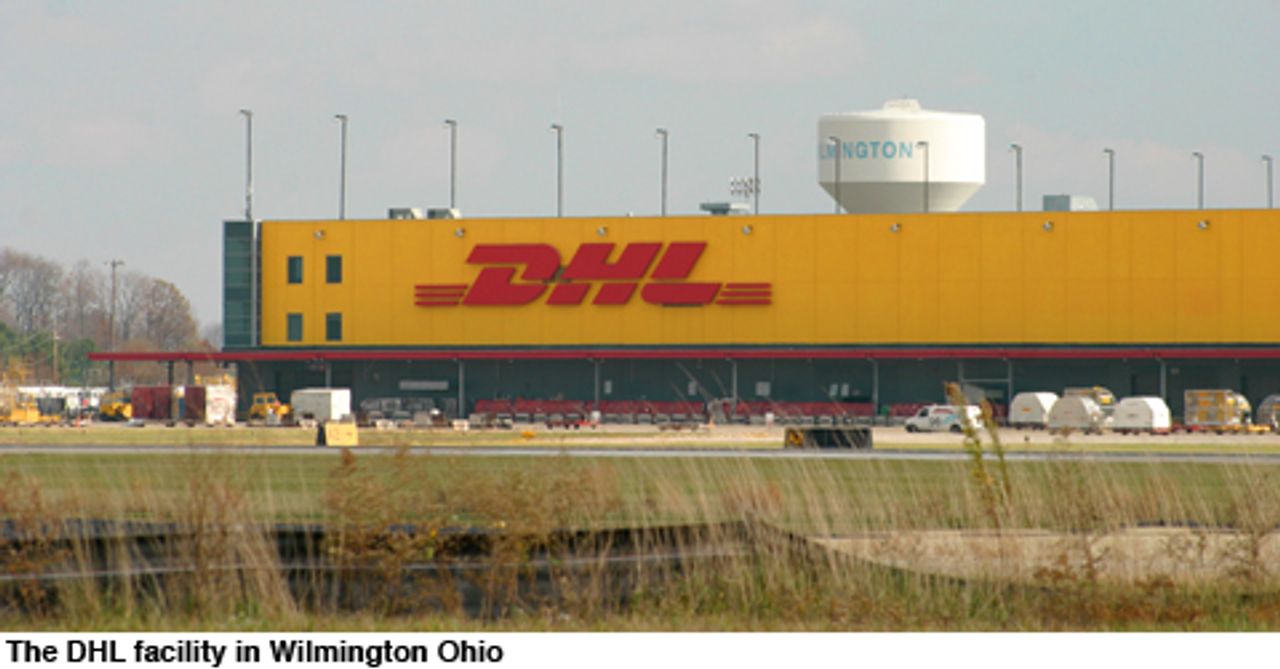 Citing the deepening economic crisis in the United States, international delivery service DHL Express last week abruptly announced it would drastically reduce its US operations. The plan, to be implemented by early 2009, leaves workers and their families to struggle with joblessness and outright collapse of local economies in company-dependent communities throughout Ohio, Pennsylvania, Texas, and California.
Citing the deepening economic crisis in the United States, international delivery service DHL Express last week abruptly announced it would drastically reduce its US operations. The plan, to be implemented by early 2009, leaves workers and their families to struggle with joblessness and outright collapse of local economies in company-dependent communities throughout Ohio, Pennsylvania, Texas, and California.
According to company announcements, DHL plans to eliminate 9,500 US jobs outright as it discontinues domestic-only air and ground deliveries within the US, shutting down all ground hubs in the country as well as 309 of its 412 stations.
These layoffs come on top of the 5,400 workers cut from DHL’s US operations in May. The latest round will bring the total number of layoffs to 16,000 in the last six months.
After the cuts, the German-based company will employ less than 4,000 to handle its international shipping to and from the US.
The social and economic impact of these job losses will be particularly devastating to Wilmington, Ohio, where DHL’s largest distributing facility is located, and the 12,000 inhabitants of this small town. According to the company, an estimated 3,500 DHL workers will lose their jobs at the Wilmington facility between now and January 31. However, the number of area residents likely to lose their jobs is far higher.
Reflecting the former economic health of the town, Wilmington was listed in 1995 as one of America’s “finest small towns” in “The 100 Best Small Towns in America,” a popular guidebook by Norm Crampton. Now it is threatened with extinction.

In addition to the DHL workers, employees at other air delivery companies servicing DHL at the Clinton County Air Park are among those who face immediate job cuts. Due to Federal Aviation Authority restrictions on air deliveries by internationally owned companies, DHL has relied on ABX Air and Astar Air Cargo to provide domestic air deliveries of their packages passing through their Wilmington hub.
This places in jeopardy an estimated 6,000 of the 7,000 ABX jobs at the Wilmington facility and hundreds more under Astar Air, according to the Dayton Daily News. Workers report that orders through the facility are slowing down already. “Who wants their stuff to be in there when the place closes?” asked one worker.
The effect of the layoffs on local government funding is also quickly making itself apparent. Lost tax revenues due to the national economic downturn have already created a $2 million shortfall for Clinton County’s $14.5 million annual budget this year. Wilmington Mayor David Raizk told the New York Times he expects 20 percent of the region’s businesses will close, while other estimates put this figure at 30 percent.
The layoffs also mean a worsening economic situation for the state of Ohio, where the unemployment rate has steadily worsened over the last several years. Part of the former manufacturing stronghold now called the Rust Belt, Ohio’s official unemployment rate presently stands at 7.2 percent, well above the national official unemployment rate of 6.5 percent. In addition to the DHL job cuts, recent layoff announcements at the General Motors plants in Warren and Dayton, and their broader economic ripple, will likely drive up state unemployment further, pushing more Ohio workers and their families into financial desperation.
State government officials are scrambling for federal unemployment aid to help the state get through the immediate crisis. According to Dennis Evans, a spokesman for the Ohio Department of Job and Family Services, the state’s unemployment insurance fund will be insolvent by late this year or early 2009, just as workers laid off by DHL will have the greatest need for these benefits.
The World Socialist Web Site sent a team of reporters to Wilmington earlier this month to interview local residents on the impact of the layoffs. Everyone the WSWS spoke with either works at the air park or has a family member or friend working there. One only needs to drive through Wilmington and approach the facility to see that estimates of the effects of the DHL layoffs on local business are quite conservative. The vast majority of area commerce is directly adjacent to the facility.
 Jeannie Steele, 19 years old, was hired in at DHL the day before WSWS reporters spoke with her. Jeannie said her job is pushing off boxes. “I was glad to get in,” stated Jeannie. “I am getting $11 an hour. The workers before me, who were fired, only made a little over $9 per hour.”
Jeannie Steele, 19 years old, was hired in at DHL the day before WSWS reporters spoke with her. Jeannie said her job is pushing off boxes. “I was glad to get in,” stated Jeannie. “I am getting $11 an hour. The workers before me, who were fired, only made a little over $9 per hour.”
Jeannie is married with two young children. Her husband is presently unemployed, making it very difficult for the young family to make ends meet. “It is just very difficult to get a job around here,” she said. “Everyone is trying to hold on to their jobs.”
She said DHL dominates the area. “My dad worked at DHL for over 20 years. They gave him a choice of a severance package and leave the company or to stay until January 31 and get nothing.” Jeannie said her father is now working as a contract worker in various cities, wherever he can find work.
“The turnover rate is very high,” Jeannie said, commenting on work in Wilmington related to DHL. “I heard it was around 62 percent of the workforce. I know a lot of people who worked here at one point or another. My husband worked here and was fired three different times.”
“With two kids it is very hard,” she said. “Most of the young people here do not have jobs. I was homeless at one point.”
“Once they close this plant I think it will be ghost town,” stated the young mother. “I know a lot of young people are saying they plan to leave to find work someplace else.”
 The WSWS also spoke to employees and owners of nearby businesses who expressed anxiety over their financial futures. Jennifer Stewart, owner of Jen’s Uptown Deli & Coffee House, noted that after DHL came to Wilmington it was considered a boomtown. Stewart told the WSWS that at one time she did more business delivering to the air park at night than she did at the deli during the day. The night deliveries have now totally ceased.
The WSWS also spoke to employees and owners of nearby businesses who expressed anxiety over their financial futures. Jennifer Stewart, owner of Jen’s Uptown Deli & Coffee House, noted that after DHL came to Wilmington it was considered a boomtown. Stewart told the WSWS that at one time she did more business delivering to the air park at night than she did at the deli during the day. The night deliveries have now totally ceased.
“I just think it’s terrible ... they’ve [DHL] just let everybody down,” said Marion George, owner of a farm equipment business near the air park. “A lot of the farmers had their second job at DHL to earn extra money,” she told the WSWS. “It’s going to be real bad.”
With fewer sales, many already struggling businesses, particularly in retail, will shut down, laying off more workers. But the layoffs at the air park will not only have a downward spiraling effect on local businesses--they will split up families and decimate neighborhoods.
For those being laid off, few will be able to find other jobs in Wilmington; most will have to commute 35 to 50 miles or more to places like Dayton or Cincinnati, relocate elsewhere entirely, or face unemployment with the support of a rapidly diminishing social safety net.
Louis Feltner, a 24-year old food service worker at Wilmington College, told WSWS reporters he expected some of his friends would be forced to move away. Many of his friends gave up other jobs in order to work at the air park where, Feltner said, they received relatively good pay and benefits and flexible hours.
 Chris Martin, a young utility worker in Wilmington, told the WSWS, “I think it’s going to turn into a ghost town, personally. If they don’t end up using that area over there at all with a new company or anything, I think there’s not going to be much of anything left around here.”
Chris Martin, a young utility worker in Wilmington, told the WSWS, “I think it’s going to turn into a ghost town, personally. If they don’t end up using that area over there at all with a new company or anything, I think there’s not going to be much of anything left around here.”
Many of the higher-paid workers with specialized skills, such as pilots and airplane mechanics, will be looking for work in a particularly difficult job market. Lydia Shaw, a full-time ABX employee, told the WSWS she expects to be making about half as much money wherever she finds another job.
Patty Beckett, whose husband has already been laid off and is receiving one week of severance pay for each of his 27 years of work at the air park, cleans houses for a living. She told the WSWS her husband is currently doing seasonal farm work for a relative. Patty said that about 10 members of her extended family worked at one of the companies at the air park.
 Chris Burton, a beautician, said many clients had expressed concern over the economic situation. “They’re worried about their income, their homes,” she told the WSWS. “How are they going to support their family? Are they going to have to move away? How are they going to sell their house? The main concern is for families, they’re all involved in it. You’ve got cousins, and uncles, and everybody involved in that type of business. And where are they going to go? Are they going to be paid the same?
Chris Burton, a beautician, said many clients had expressed concern over the economic situation. “They’re worried about their income, their homes,” she told the WSWS. “How are they going to support their family? Are they going to have to move away? How are they going to sell their house? The main concern is for families, they’re all involved in it. You’ve got cousins, and uncles, and everybody involved in that type of business. And where are they going to go? Are they going to be paid the same?
“There are a lot of homes for sale,” Burton said. “You see a lot of people losing their homes right now. More than I’ve ever seen in the paper … that’s really sad to see.”
Perhaps most indicative of the situation facing Wilmington-area families was a November 14 item in the local paper, the Wilmington News Journal. As part of a series sponsored by the city, a local attorney was scheduled to give a free presentation to “address potential legal concerns during times of transitions such as: custodial and visitation if a parent leaves the city or state for a new job; setting up power-of-attorney for banking, etc., guardianship for children, permission to medically treat a minor in times of separation from legal guardian...”
In Wilmington, people are preparing for the worst.
